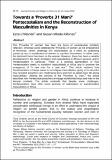| dc.contributor.author | CHITANDO, Ezra; KILONZO, Susan Mbula | |
| dc.date.accessioned | 2022-01-31T11:46:43Z | |
| dc.date.available | 2022-01-31T11:46:43Z | |
| dc.date.issued | 2018 | |
| dc.identifier.uri | https://repository.maseno.ac.ke/handle/123456789/4812 | |
| dc.description | DOI:10.14426/ajgr.v24i1.41 | en_US |
| dc.description.abstract | The ‘Proverbs 31 woman’ has been the focus of considerable scholarly
reflection. Whereas some celebrate the ‘Proverbs 31 woman’ as the embodiment
of femininity, others challenge this interpretation as it infers an underlying
patriarchy and a socialisation of women to sacrifice themselves. In either case,
the dominant focus has been on the woman. However, there has been a notable
development in the study of religion and masculinities in Africa in general, and in
Pentecostalism in particular. There is a growing appreciation of how
Pentecostalism seeks to transform masculinities in Africa and to promote the
emergence of “a new man for a new era.”
3
This article explores how
Pentecostalism in Kenya seeks to reconfigure masculinities, going on to describe
how selected preachers are challenging boys and men to adopt more life-giving
masculinities. Utilising the concept of the ‘Proverbs 31 man’,4
the article
describes how Pentecostal preachers envisage transformed boys and men in the
Kenyan contexts. The article contends that despite some challenges,
Pentecostalism does offer some promise of redemptive or transformative
masculinities in Africa. | en_US |
| dc.publisher | Research gate | en_US |
| dc.title | Towards a ‘Proverbs 31 Man?’ Pentecostalism and the Reconstruction of Masculinities in Kenya | en_US |
| dc.type | Article | en_US |

